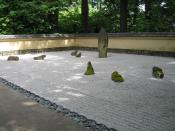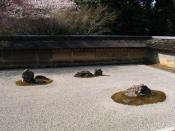The Zen Rock Garden
The dry landscape garden, or karesansui, is a symbolic element in Zen. Not only is it utterly simple, which is very common to Zen, but it is also very planned and structured. A possible catalyst for enlightenment, the Zen garden is used as a place for contemplation, deep thought, and zazen. It is considered to be the serenity in a chaotic world and can release one from such chaos. The garden is much like the concept of wu or mu, the notion of a void beyond all form and color. Some gardens are walked through and others are to only be looked at, but all are carefully planned and maintained environments; if a leaf were to fall, it would be removed in order to maintain the designer's plan.
The primary intention of any Zen garden is its ability to guide one to satori, or enlightenment. One could simply gaze at the garden, contemplating its meaning while meditating in order to reach satori.
For example, the dry landscape garden at Ryoanji has various interpretations of its meaning. Some say that the pebbles represent the rocky waves of the ocean and the rocks are the islands of Japan. Others interpret the boulders to represent mountains, and the pebbles the clouds through which the peaks stick out. One could find many meanings for the rock garden, and in doing so could be in deep contemplation. The student who maintains the garden, raking the pebbles into a distinct pattern, would also be on the path to satori. The constant repetitive motions would free one's mind of the mundane in order to contemplate that which is important, much like a koan. Whoever gazes upon the garden, despite culture or religion, can appreciate its beautiful simplicity and Japanese aesthetic. It could be...



Overall Great!
A great essay, a nice breadth of the topic is introduced.
I would suggest adding more information on 'Buddha nature,' what that means, what it is, etc. This would set the essay over the top as it is already nicely written.
6 out of 6 people found this comment useful.